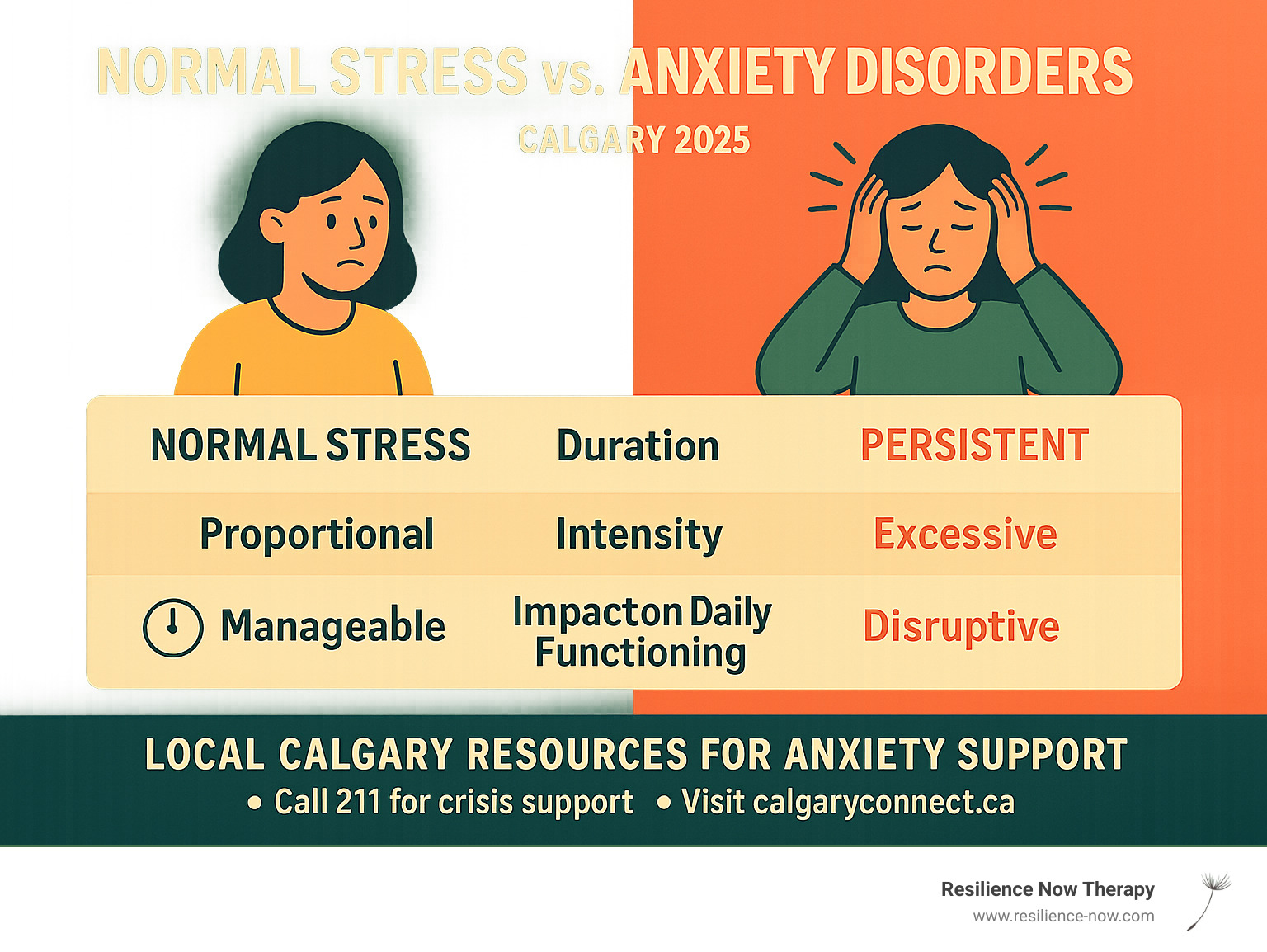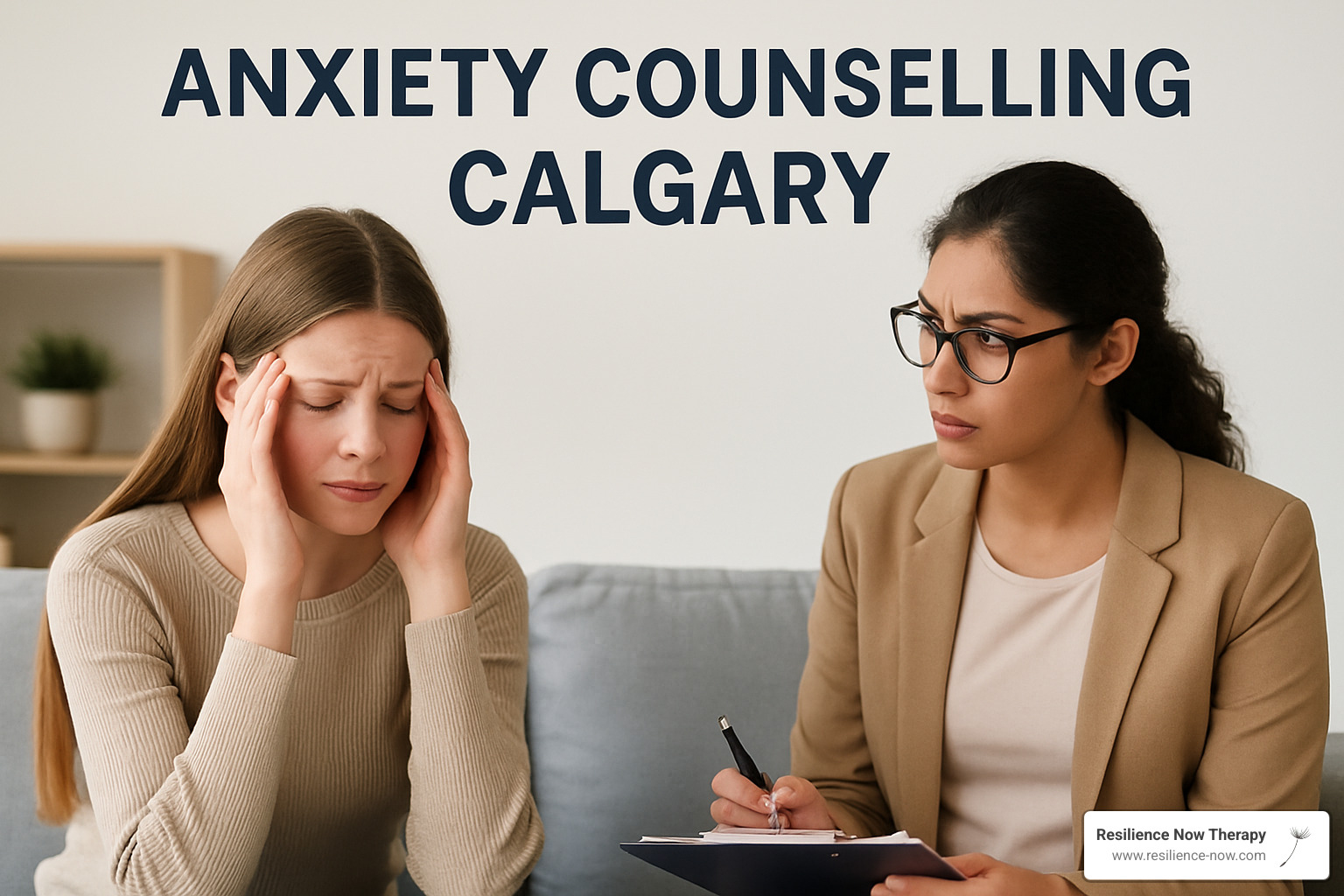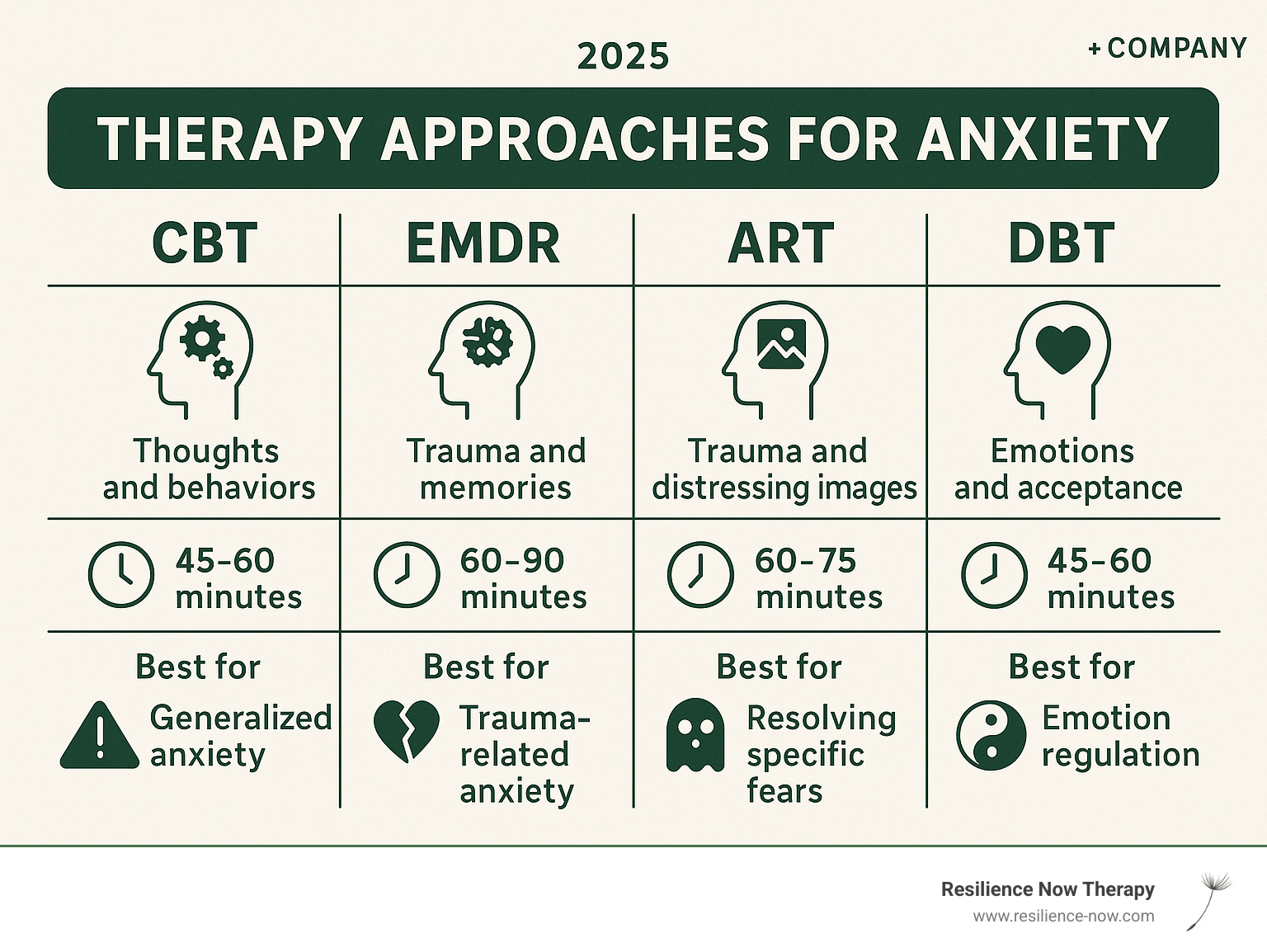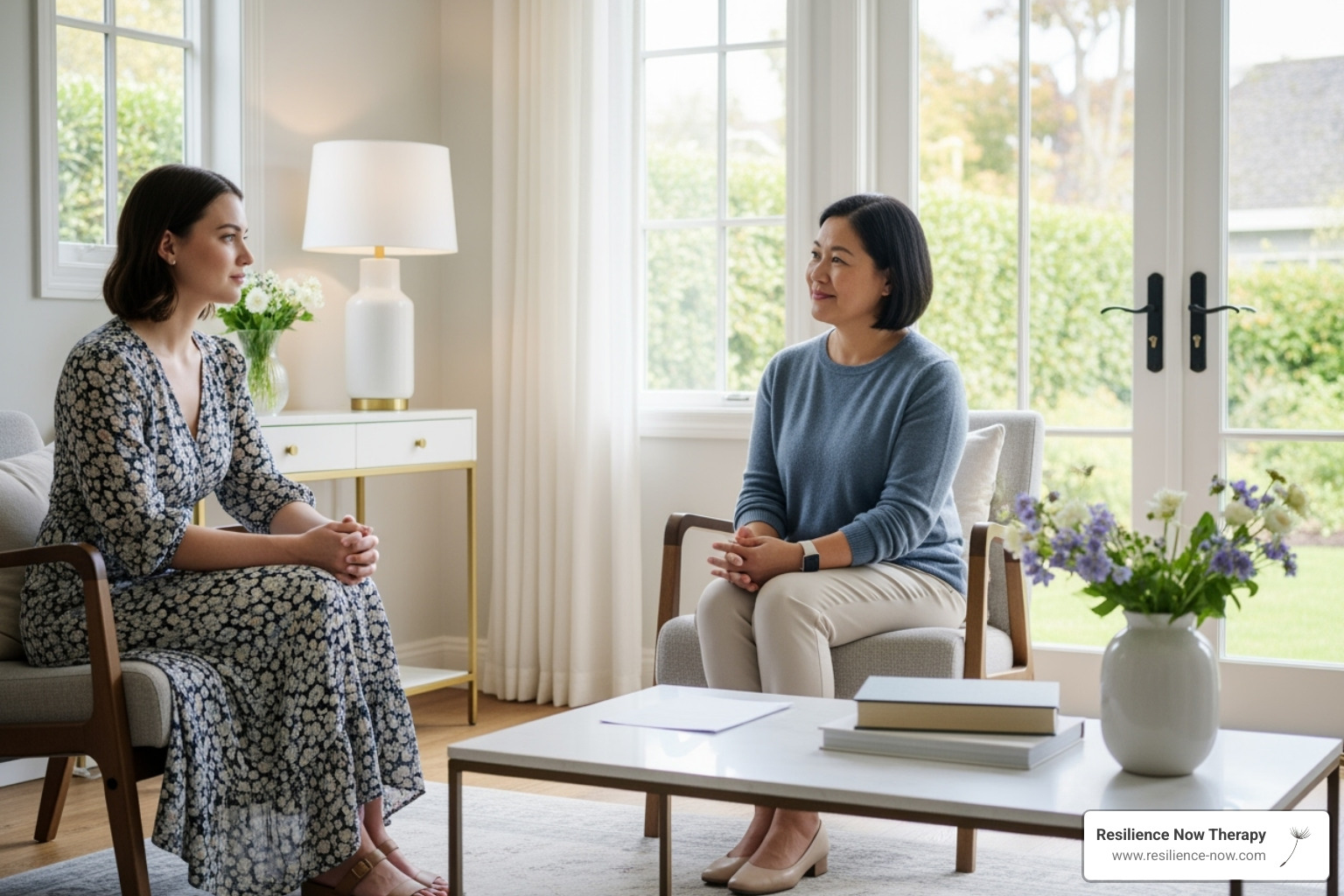Your Guide to Calgary Anxiety Counselling: From Overwhelm to Inner Peace

Understanding Anxiety Disorders in High-Achieving Calgary Women
If you're a woman in Calgary who appears to have it all together on the outside while battling racing thoughts, self-doubt, and emotional exhaustion on the inside, you're not alone. Many accomplished women find themselves experiencing anxiety that feels impossible to quiet, despite their external success.
As someone who specializes in Calgary anxiety counselling, women trust I understand the unique mental health concerns you face. Whether you're in a helping profession like nursing, teaching, or social work, or managing a high-stress career while juggling countless responsibilities, the perfectionism and people-pleasing patterns that once helped you succeed may now be contributing to chronic stress and anxiety.
Research shows that nearly 30% of adults will experience an anxiety disorder at some point in their lives, and women are twice as likely to be affected. The good news? At Resilience Counsellng and Consulting, we see every day that anxiety is highly treatable with the right evidence-based approaches and a personalized therapy plan.
When High-Functioning Anxiety Becomes a Mental Health Concern
High-functioning anxiety often flies under the radar because from the outside, everything looks perfect. You meet deadlines, excel at work, and take care of everyone around you. But internally, you're running on empty, experiencing anxiety symptoms that interfere with your well being and daily life.
Many of my clients describe feeling like they're wearing a mask—appearing confident and capable while privately struggling with anxiety symptoms including:
- Racing thoughts that won't quiet down, especially at night
- Physical symptoms like tension headaches, tight shoulders, chest pain, or digestive issues
- Muscle tension that never seems to fully release
- Intrusive thoughts and constant worry about future scenarios
- Imposter syndrome despite clear evidence of your competence
- Difficulty saying no, leading to overcommitment and burnout
- Perfectionism that makes even small tasks feel overwhelming
- Self-doubt that undermines your achievements and affects self esteem
Recognizing When Anxiety Crosses the Line
Normal stress has a clear beginning and end—it shows up for specific situations and fades when the stressor passes. Anxiety disorders, however, create persistent worry that interferes with your daily life, relationships, and ability to enjoy the things you once loved.
If you've been experiencing anxiety symptoms for several weeks, and these mental health concerns are affecting your work performance, relationships, or sleep, it's time to consider professional anxiety counselling.
Common Types of Anxiety Disorders I Treat
Understanding the different types of anxiety disorders can help you recognize your own experience and seek appropriate anxiety therapy. Through my calgary anxiety counselling practice, I work with women experiencing various anxiety disorders:
Generalized Anxiety creates persistent worry about multiple areas of life. Women with generalized anxiety often describe feeling like their mind never stops racing, making it difficult to enjoy daily life or feel truly relaxed.
Panic Disorder involves sudden, intense episodes of fear called panic attacks. These panic attacks can include physical symptoms like chest pain, shortness of breath, and feelings of impending doom, often leading to fear of having future panic attacks.
Social Anxiety goes far beyond normal shyness—it's an intense fear of being judged or humiliated in social situations, often affecting work presentations, social gatherings, and relationship building.
Post Traumatic Stress Disorder can develop after experiencing traumatic events, keeping your nervous system on high alert and contributing to ongoing anxiety symptoms.
These anxiety disorders often co-occur with other mental health concerns like low self esteem, relationship difficulties, and challenges during major life transitions.
The Physical Reality of Anxiety Symptoms
Anxiety disorders aren't just mental health issues—they create very real physical symptoms throughout your body. Your nervous system responds to perceived threats by flooding your body with stress hormones, creating exhausting and sometimes alarming physical symptoms.
Common physical symptoms of anxiety disorders include:
- Racing heartbeat, chest pain, or chest tightness
- Shortness of breath or feeling like you can't catch your breath
- Muscle tension, particularly in your shoulders, neck, and jaw
- Digestive issues or stomach problems
- Sleep disturbances or feeling tired but wired
- Headaches or migraines
- Sweating or trembling during anxiety episodes
These physical symptoms aren't "all in your head"—they're your nervous system's genuine response to stress. Understanding this can help reduce self-criticism and guide you toward effective anxiety therapy approaches that address both the mental and physical aspects of anxiety disorders.

Evidence-Based Anxiety Therapy Approaches for Treating Anxiety
Not all therapy approaches are equally effective for treating anxiety disorders. I specialize in evidence-based anxiety therapy methods that have been rigorously tested and proven to help people overcome anxiety, often more quickly than traditional talk therapy approaches.
EMDR Therapy: Comprehensive Trauma Therapy
Eye Movement Desensitization and Reprocessing (EMDR) is particularly effective when anxiety disorders have roots in past experiences or trauma. Many high-achieving women carry the weight of earlier experiences that continue contributing to current anxiety symptoms.
EMDR therapy helps your brain process these stored memories and experiences in a new way, reducing their emotional charge and the anxiety symptoms they continue to trigger. This trauma therapy approach can work more quickly than traditional talk therapy, with many clients experiencing significant relief within several sessions.
EMDR Intensives: Accelerated Anxiety Treatment
For women with busy schedules who want to make rapid progress in treating anxiety, I offer EMDR intensives. These longer therapy sessions allow us to work through anxiety-provoking issues more comprehensively in a shorter timeframe, making them ideal for professionals who prefer focused, intensive anxiety therapy over extended weekly counselling sessions.
Accelerated Resolution Therapy (ART)
ART is an innovative approach that combines elements of several proven therapies to help you process difficult experiences quickly and effectively. Like EMDR, ART can produce significant results in fewer sessions than traditional approaches, making it excellent anxiety therapy for busy professionals seeking to overcome anxiety efficiently.
Trauma-Informed Stabilization Treatment
TIST (Trauma-Informed Stabilization Treatment) can be a powerful approach for working with anxiety—especially when it feels overwhelming or rooted in past experiences. Before diving into deeper processing, TIST focuses on strengthening nervous system regulation and building internal safety. By working with the protective parts of you that carry fear, tension, or self-criticism, TIST helps reduce reactivity and create the emotional stability needed for lasting relief from anxiety.
Internal Family Systems Informed Therapy
This approach recognizes that we all have different "parts" of ourselves—the achiever, the people-pleaser, the inner critic, the part that just wants to rest. Internal Family Systems informed therapy helps you understand and heal the relationships between these different aspects of yourself, leading to greater internal harmony and reduced anxiety symptoms.
Exposure Therapy and Cognitive Behavioural Therapy Elements
While I don't practice traditional exposure therapy or cognitive behavioural therapy exclusively, I incorporate elements of these evidence-based approaches when appropriate for treating anxiety. Exposure therapy principles help clients gradually face feared situations in a safe, controlled way, while cognitive behavioural therapy techniques help identify and challenge anxious thinking patterns that fuel anxiety disorders.

My Personalized Approach to Calgary & Alberta Anxiety Counselling
Every woman seeking anxiety counselling has a unique story, specific triggers, and individual goals for treating anxiety. That's why I never use a one-size-fits-all approach to anxiety therapy. Instead, I provide tailored therapy to address your specific needs, drawing from multiple evidence-based modalities to create personalized treatment for your anxiety disorders.
During my intake process for anxiety counselling, I take time to understand:
- Your current anxiety symptoms and how they're affecting your daily life
- The history and development of your anxiety patterns
- Your strengths, resources, and past coping strategies
- Your goals for anxiety therapy and what you hope to achieve
- Any past experiences that may be contributing to current anxiety disorders
- How anxiety affects your self esteem and relationships
What to Expect in Our Anxiety Therapy Work Together
I offer a free 15-minute phone consultation where we can discuss your mental health concerns and determine if my approach to treating anxiety is a good fit for you. This conversation allows you to get a sense of my therapy style and ask any questions about the anxiety counselling process.
Your first appointment is a comprehensive 50-minute intake session—a guided conversation designed to help me understand you and what you'd like to work on changing through anxiety therapy. This isn't an interrogation; it's a collaborative exploration of your experiences and goals for overcoming anxiety.
After our initial session, I typically schedule anxiety counselling appointments on a weekly or biweekly basis, depending on your needs and goals for treating anxiety. Consistent attendance is particularly important when we're doing the deeper work of addressing core issues and patterns underlying anxiety disorders.
To support lasting change between therapy sessions, I may offer homework, reflections, and practical tools you can use in your everyday life. These aren't burdensome assignments—they're carefully chosen exercises designed to help you apply insights and skills for managing anxiety symptoms in real-world situations.
Specialized Support for Women's Unique Mental Health Concerns
Having worked extensively with many women experiencing anxiety, I understand the specific pressures and expectations you face. Society often teaches women to prioritize others' needs above their own, to be perfect in multiple roles, and to make things look effortless even when anxiety disorders are creating internal turmoil.
Perfectionism, People-Pleasing, and Self Esteem
Perfectionism and people-pleasing often develop as survival strategies early in life, but they can become sources of chronic anxiety symptoms in adulthood and contribute to poor self esteem. Through our anxiety therapy work together, you'll learn to:
- Recognize perfectionist thoughts and challenge their validity
- Set healthy boundaries without guilt
- Develop self-compassion when things don't go perfectly
- Distinguish between healthy striving and anxious perfectionism
- Build genuine self esteem based on self-acceptance rather than achievement
Imposter Syndrome and Self-Doubt
Despite your accomplishments, you may struggle with feeling like a fraud or worry that others will discover you're not as competent as they think. This imposter syndrome is incredibly common among high-achieving women and can fuel ongoing anxiety symptoms while undermining self esteem.
Our anxiety therapy helps you:
- Recognize and challenge self-doubting thoughts
- Develop a more realistic and compassionate self-assessment
- Build genuine confidence based on your actual abilities and achievements
- Learn to internalize positive feedback and accomplishments
- Improve self esteem through evidence-based techniques
Relationship Issues and Life Transitions
Anxiety often intensifies during major life transitions—career changes, relationship shifts, health concerns, or family changes. These periods of transition can trigger anxiety symptoms and create relationship difficulties as you navigate uncertainty and change.
Through anxiety counselling, we'll explore:
- How anxiety affects your relationships and communication patterns
- Strategies for managing anxiety during life transitions
- Ways to maintain supportive relationships while working on your mental health
- How to communicate your needs during challenging periods
- Building resilience for future life transitions
Practical Tools for Managing Anxiety Symptoms
While our anxiety therapy work addresses the root causes of anxiety disorders, I also provide practical tools you can use immediately to manage anxiety symptoms and build resilience for your mental health.
Nervous System Regulation and Emotional Regulation
Learning emotional regulation skills is fundamental to treating anxiety disorders. Through anxiety therapy, I teach specific techniques for:
- Recognizing early signs of nervous system activation
- Using breathwork to shift your physiological state
- Grounding techniques that help you feel safe and present
- Progressive muscle relaxation to release physical symptoms of anxiety
- Developing strategies for emotional regulation in stressful situations
Cognitive Strategies for Treating Anxiety
Your thoughts have tremendous power over your emotional state and anxiety symptoms. Through anxiety counselling, I'll help you develop strategies to:
- Identify anxious thought patterns that fuel anxiety disorders
- Challenge thoughts that aren't helpful or realistic
- Develop more balanced, compassionate self-talk
- Create mental shortcuts for managing worry spirals
- Build skills for taking control of racing thoughts
Lifestyle Integration for Mental Health
Sustainable anxiety treatment involves making small but significant changes to your daily routine that support your mental health. Through our anxiety therapy work, we'll explore:
- Sleep hygiene practices that support nervous system recovery
- Nutrition choices that stabilize mood and energy
- Exercise approaches that reduce anxiety symptoms without adding pressure
- Boundary-setting strategies for work and relationships
- Creating supportive environments that promote well being

Understanding the Path to Treating Anxiety
Recovery from anxiety disorders isn't linear, and it's important to have realistic expectations about the anxiety therapy process. Most of my clients begin to notice some relief within the first few sessions, often simply from understanding what's happening in their nervous system and having someone truly understand their experience with anxiety.
For evidence-based approaches like EMDR and ART, many people experience significant improvement in anxiety symptoms within fewer therapy sessions than talk therapy, though this varies depending on individual circumstances and goals for treating anxiety.
Factors That Influence Your Anxiety Treatment Timeline
Several factors can affect how quickly you experience relief from anxiety symptoms:
- How long you've been experiencing anxiety
- Whether there are underlying traumatic experiences contributing to anxiety
- Your current stress levels and life circumstances
- How consistently you practice the tools and techniques from anxiety therapy
- Your overall support system and life stability
- Your motivation and readiness for creating positive change
Remember that healing from anxiety often involves some ups and downs. You might have a week where you feel significantly better, followed by a few difficult days. This is completely normal in anxiety treatment and doesn't mean you're not making progress in overcoming anxiety.
In Person and Online Calgary & Alberta Anxiety Counselling Options
I offer both in person and online anxiety counselling sessions to accommodate your preferences and schedule. Many busy professionals appreciate the flexibility of online sessions, which eliminate travel time and allow you to receive anxiety therapy from the comfort of your own space.
Research consistently shows that online therapy is just as effective as in person treatment for anxiety disorders. The therapeutic relationship and evidence-based techniques for treating anxiety remain the same regardless of format.
Some clients prefer to begin with in person anxiety counselling sessions to establish connection and then transition to online sessions for ongoing anxiety therapy. Others find they're more comfortable opening up in their own environment from the very beginning. We can discuss what feels right for your anxiety treatment during our initial consultation.
Whether you choose in person or online anxiety counselling, my commitment to providing effective treatment for anxiety remains the same. Both formats offer a supportive environment where you can work on overcoming anxiety and building the skills needed for lasting mental health.
Personal Growth Through Anxiety Treatment
Working through anxiety disorders often leads to unexpected personal growth and positive changes that extend far beyond symptom relief. Many clients discover that anxiety therapy helps them:
- Develop deeper self-awareness and emotional intelligence
- Build stronger, more authentic relationships
- Clarify their values and priorities
- Develop resilience for handling future challenges
- Experience greater life satisfaction and well being
- Create positive change in multiple areas of their lives
This personal growth aspect of treating anxiety is often one of the most rewarding parts of the therapeutic process. As you develop strategies for managing anxiety symptoms, you simultaneously build life skills that enhance your overall quality of life.

Seeking Support: Taking the First Step
If you're tired of feeling anxious, overwhelmed, and disconnected from the peace you desire, it may be time to consider professional anxiety counselling. You don't need to wait until you're in crisis or completely overwhelmed to reach out for anxiety therapy—in fact, seeking support earlier often leads to faster, more lasting results in treating anxiety.
Many anxiety therapists understand that taking the first step toward seeking support can feel intimidating, especially when anxiety symptoms make everything feel more challenging. Remember that reaching out for anxiety counselling is a sign of strength and self-awareness, not weakness.
What Happens Next in Your Anxiety Treatment Journey
The journey toward overcoming anxiety and feeling genuinely at peace with yourself begins with a single conversation. During our free 15-minute consultation, we'll discuss your current anxiety symptoms, explore whether my approach to anxiety therapy is a good fit for your needs, and answer any questions you have about the counselling process.
This brief conversation can help you determine if specialized anxiety therapy is right for you, without any pressure or commitment. My goal is simply to provide clarity about your therapy options and help you make an informed decision about your mental health care and treating anxiety.
Your Future Self is Waiting
Imagine waking up feeling calm and grounded, approaching your day with confidence rather than dread. Picture yourself setting boundaries without guilt, achieving your goals without burning out, and feeling genuinely at peace with who you are. Envision having strong self esteem and healthy relationships built on authentic connection rather than anxiety-driven people-pleasing.
This isn't an impossible dream—it's an achievable reality for women who commit to doing the deeper work of treating anxiety at its roots. Through specialized anxiety therapy approaches like EMDR, ART, and trauma-informed care, you can develop the tools and insights needed to transform your relationship with anxiety and experience lasting personal growth.
Your anxiety doesn't define you, and it doesn't have to limit your future. With the right anxiety counselling and evidence-based treatment, you can learn to manage anxiety symptoms effectively while building the kind of inner resilience that helps you thrive in all areas of life.
The path to overcoming anxiety and feeling genuinely calm and confident is available to you. Your future self—the one who feels at peace, sets healthy boundaries, and approaches life with quiet confidence—is waiting for you to take that first step toward seeking support.
Contact me today to learn more about how personalized Calgary & Alberta anxiety counselling can help you overcome anxiety, improve your mental health, and build the resilient, fulfilling life you deserve.
